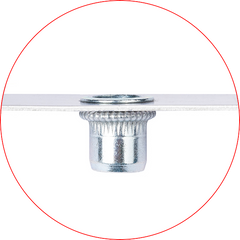Lab
Rivet Nut, Rivnut, Rivet Test Lab Services.
Offering outstanding support by providing rivet, rivnut, rivet nut, lock bolts and sealant testing services in conjunction with a NATA (National Association of Testing Authority) accredited fastener lab. We aim for a total rivet supply solution with an award-winning customer service focus, your one-stop shop for technical know-how, supply of goods & rivet tool hire through to the servicing of your riveting tools.
100% dedication to customers is solving application issues when things go wrong.
Our technical service representatives are available to assist most of our customers with industry know-how plus the scientific fastener testing facilities when required for critical applications or when something goes wrong. From a rivet that is not clamping the material correctly to a nutsert that is not pulling up evenly through to an adhesive that is not curing. We can assist determine the issue with mechanical performance data and laboratory testing services to problem-solve even the most challenging application.

Rivet Nut Lab Overview of Installation Issues With Riley the Rivet Lad.
Installing rivet nuts can sometimes be tricky, so we have complied the following rivet nut images to address the most common installation matters. The pictures below show the difference between an incorrectly installed rivnut (pictures 1 & 2) and a correctly installed rivnut (picture 3). Fastener installation issues can often stem from improper torque (over/under-tightening), poor hole preparation (size, cleanliness, alignment), or the quality of the fastener leading to following issues.
1. Inadequate Rivet Nut Bulge.
The rivet nut is not gripping the material correctly, causing the rivnut to spin whilst installing the bolt. In this instance, remove the nutsert and check the stroke on the tool before attempting to install another.
2. Over-stroked Rivet Nut Bulge.
This can cause the parent material to buckle, or cause the rivet nut to tilt on one side and/or lose the internal thread, resulting in an uneven thread and resistance to the bolt being threaded through.
3. Correct Rivet Nut Bulge.
When installed correctly, there is no tilting and the rivnut is well balanced between gripping the material and allowing a bolt to be threaded through with no resistance.



Other rivet nut installation issues:
Stripped thread: this is most probably caused by too much stroke or tension, or due to the tool's mandrel being bent/damaged.
Tilting rivnut: The quality of the rivet nut may be questionable, the tool mandrel is bent or the anvil size may not be correct.
Scratched head: Check you have the correct size anvil on the tool.
You can avoid many fastener installation issues by following manufacturer specs, using correct tools, ensuring material compatibility, and proper hole sizing.
Rivet Test Lab Overview of Installation Issues With Riley the Rivet Lad.
Rivets are very popular because they are a quick and easy way to join two or more pieces of material. A strong reliable option that provides a secure solution via a power rivet gun or a manual rivet-tool. Installing rivets can sometimes be challenging because there are a number of issues to consider when selecting a rivet. When reviewing a rivet failure, there could be a couple of reasons your rivet has failed. The issue could be a dodgy rivet from a shifty supplier, or rivet selection. Either way we offer a wide range of technical services, including rivet testing services. We have teamed up with a NATA approved lab, that undertakes laboratory rivet testing services.
1. Rivet not pulling up.
This could be due to an incorrect nose tip (anvil) or another tool issue. Check the rivet's material grip range and drill hole size for irregularities.

2. Mandrel outside head.
This could be an incorrect nose tip (anvil) or tool. Damaged or bent mandrel. Oversize or irregular hole. Check the material grip range and or rivet suitability.

3. Mandrel snapping incorrectly.
Refer to the rivet's material grip range specifications, it appears that the selected rivet is not suitable for the given material depth.

Rivet Rivnut Lab Services.
Aerobolt has the industry know-how plus the scientific fastener testing facilities when required for critical applications or when something goes wrong. From a rivet that is not clamping the material correctly to a nutsert that is not pulling up evenly through to a sealant that is not curing correctly. We can help determine the issue with mechanical performance data and laboratory testing services to problem-solve even the most challenging application.Simply contact us for your nutserts, rivnuts, rivet nuts, rivets, lock bolt and adhesive issues.